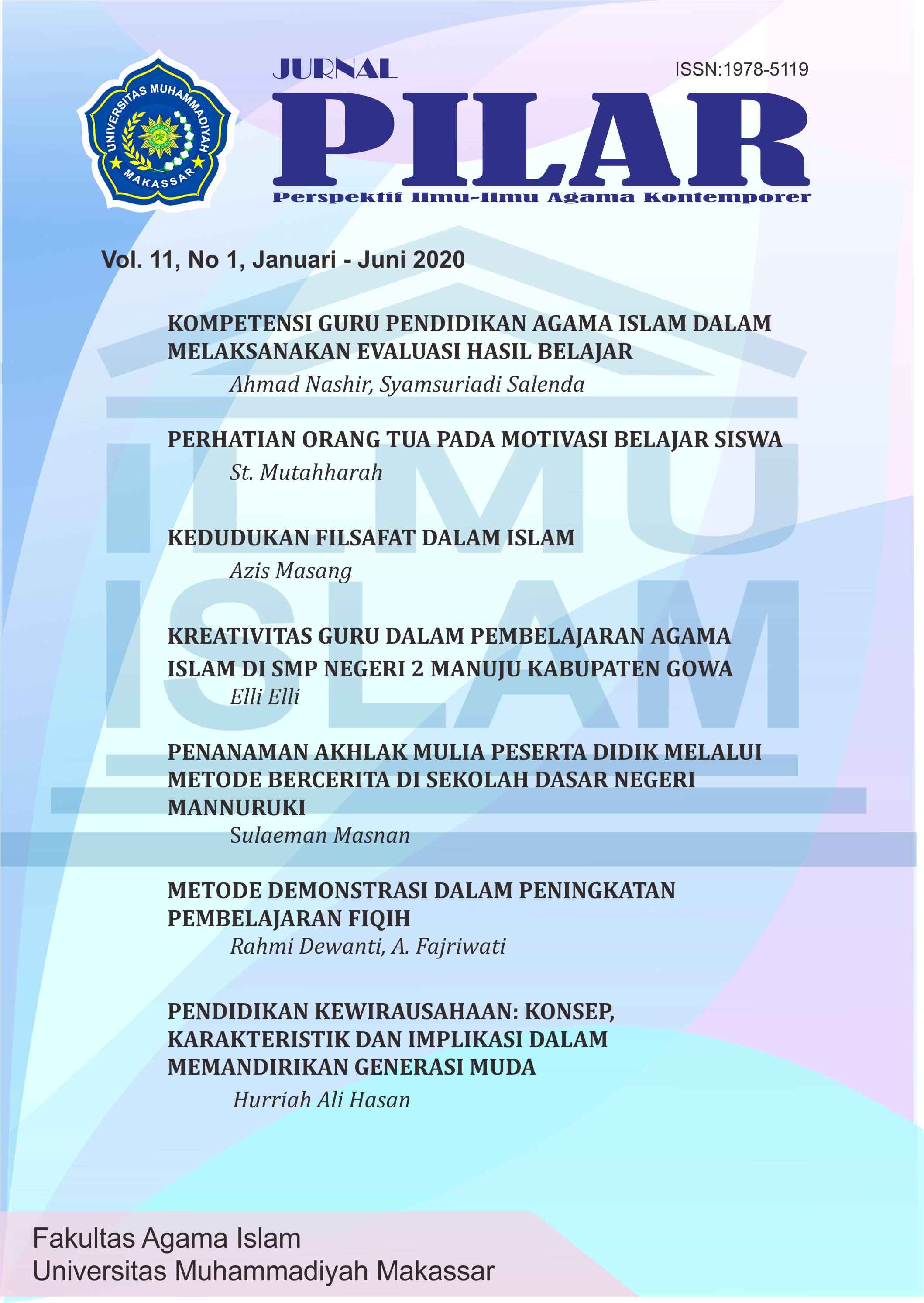PENDIDIKAN KEWIRAUSAHAAN: KONSEP, KARAKTERISTIK DAN IMPLIKASI DALAM MEMANDIRIKAN GENERASI MUDA
DOI: https://doi.org/10.26618/4kk81869
Abstract
Kajian ini menjelaskan tentang pentingnya pendidikan kewirausahaan diberikan kepada generasi muda melalui pendidikan formal, agar mereka dapat membangun kemandirian dalam meningkatkan kesejahteraan. Banyak pihak yang menilai bahwa untuk membangun kewirausahaan, seseorang harus memiliki bakat dan keterampilan, sehingga tidak semua individu dapat terlibat dalam kegiatan kewirausahaan tersebut. Namun dengan semakin terbatasnya lapangan pekerjaan sementara jumlah penduduk usia kerja yang terus bertambah, tidak dapat lagi diserap oleh lapangan kerja yang terbatas. Penyelesaian yang dapat ditawarkan untuk mengatasi masalah lapangan kerja yang sempit dan pengangguran yang tinggi adalah dengan mendorong generasi muda agar terlibat dalam kegiatan kewirausahaan. Karena itu, banyak negara yang telah menerapkan konsep pendidikan kewirausahaan dalam pendidikan formal pada tingkat pendidikan tinggi. Tujuan pendidikan kewirausahaan tersebut adalah membantu individu yang ‘tidak’ memiliki jiwa kewirausahaan, dapat membangun rasa percaya diri, mengembangkan kreativitas dan inovasi serta berani mengambil risiko. Kajian ini menjelaskan konsep pendidikan kewirausahaan pada tingkat pendidikan formal, di mana keterlibatan pendidik sangat menentukan bagaimana proses mendorong minat generasi muda untuk ikut terlibat dalam kewirausahaan.
References
Al Qur’an Al Karim. Departemen Agama RI.
Bechard, J. and Toulouse, J. (1998). Validation of a didactic model for the analysis of training objectives in entrepreneurship. Journal of Business Venturing. Vol. 13 No. 4, pp. 317- 32.
Cantillon, R. (2010). An Essay on Economic Theory. Ludwig von Mises Institute and published under the Creative Commons Attribution License 3.0. Mises Institute.
Drucker, P.F. (1985). The Practice of Entrepreneurship, Innovation and Entrepreneurship Practice and Principles. New York: Harper & Row, pp. 141-188
Fayolle A. (2009). Entrepreneurship Education in Europe: Trends and Challenges. OECD LEED Programme. Universities, innovation and entrepreneurship: good practice workshop.
Frinces, Z. Heflin. Pentingnya Profesi Wirausaha di Indonesia. Jurnal Ekonomi & Pendidikan, Volume 7 Nomor 1, April 2010, h 34-57.
Gangaiah, B. & Viswanath, J. (2014). Impact of Indian management education in developing entrepreneurial aspirations and attitudes among management students. Asia Pacific Journal of Research, Vol: I 1 .pp1-10.
Garavan, T. and O'Cinneide, B. (1994). Entrepreneurship education and training programmes:a review and evaluation – part 1. Journal of European Industrial Training, Vol. 18 No. 8,pp. 3-12
Gibb, A. A. (1996). Entrepreneurship and small business management: can we afford to neglect them in the 21st century business school? British Journal of Management, 7: 309-321.
Jamieson, I. (1984). Schools and Enterprise. In Watts, A. & Moran, P. (eds.) Education for enterprise. Cambridge: CRAC
Johannisson, B. & Olaison, L. (2006). Emergency Entrepreneurship – Creative Organising in the Eye of the Storm, RENT XX Conference, Brussels, Belgium, 23-24.11.2006. Published in Conference Proceeding
Jones, C. and English, J. (2004). A Contemporary approach to entrepreneurship education. Education + Training, Vol. 46 Nos 8/9, pp. 416-23.
Kirby, D. (2004). Entrepreneurship education: can business schools meet the challenge? Education Training, Vol. 46 + No 8/9, pp. 510-19.
Kuratko, D. F. (1997). Entrepreneurship. International Encyclopaedia of Business and Management. London: Routledge Publishers, p.168-176
Lee, S.M., Lim, S.-B., Pathak, R.D., Chang, D. and Li, W. (2006). Influences on students' attitudes towards entrepreneurship: a multi-country study. The International Entrepreneurship and Management Journal, Vol. 2 No. 3, pp. 351-66.
Matlay, H. and Mitra, J. (2002). Entrepreneurship and learning: The double act in the triple helix. The International Journal of Entrepreneurship and Innovation, Vol. 3 No. 1
Michaelsen, L.K. and Sweet, M. (2008). The essential elements of team-based learning. New Directions for Teaching and Learning, Vol. 2008 No. 116, pp. 7-27.
Milla, Hilyati. Pendidikan Kewirausahaan: Sebuah Alternatif Mengurangi Pengangguran Terdidik Dan Pencegahan Korupsi. Jurnal Al-Ta’lim, Jilid 1, Nomor 6 November 2013, hlm. 465-471
Pittway, L. and Cope, J. (2007).Entrepreneurship education: a systematic review of the Evidence. International Small Business Journal, Vol. 25 No. 5, pp. 479-510
Rae, D. & Carswell, M. (2001). Towards a conceptual understanding of entrepreneurial learning, Journal of Small Business and Enterprise Development. 8(2). 150 – 158.
Schumpeter, J.A. (1934). The Theory of Economic Development: An Inquiry into Profits, Capital, Credit, Interest, and the Business Cycle. Cambridge, Mass.: Harvard University Press, [1911] 1934
Timmons, J.A. (1999). New Venture Creation – Entrepreneurship for the 21st century. NewYork: Irwin McGraw-Hill.
World Economic Forum (2009). Educating the Next Wave of Entrepreneurs, a report of the Global Education Initiative. World Economic Forum. Geneva.








